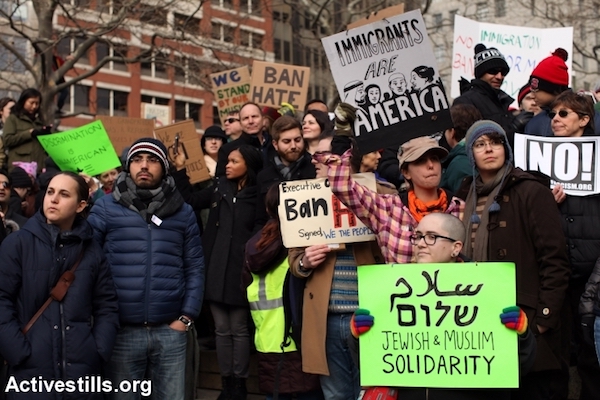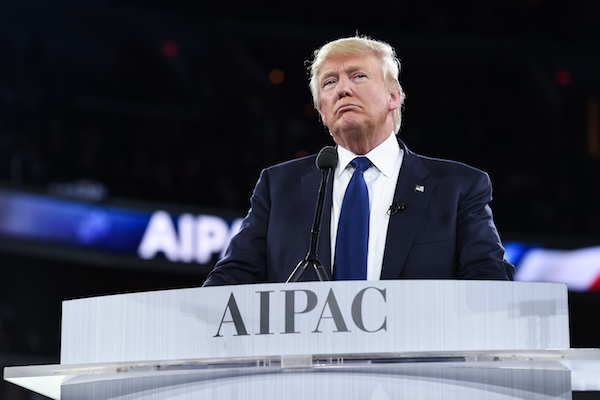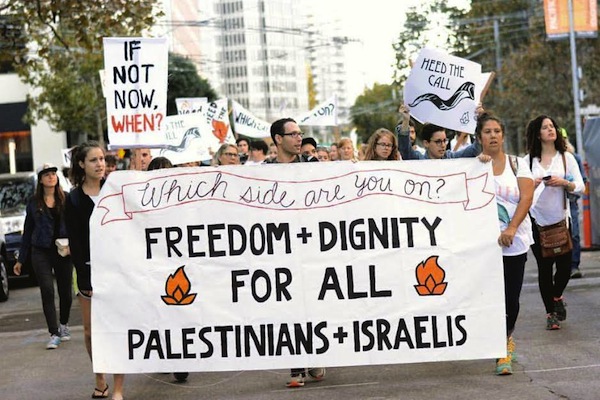Can American Jews’ relationship to Israel accommodate the truth that Palestinians deserve the same freedom and dignity that we want for ourselves as Jews and for our Muslim, immigrant, black and brown neighbors here in the United States?
By Emily Mayer

There is currently a surge of activism churning through the American Jewish community. Since Trump’s election in November, American Jews have been taking action against a president who received only 24 percent of their votes, the second-smallest proportion of any religious or racial demographic in the country, after African Americans.
Last month, 20 rabbis were arrested protesting the first iteration of Trump’s travel ban, also referred to as a Muslim ban, and 2000 more signed onto a statement supporting refugees. Major Jewish organizations such as the National Council of Jewish Women and American Jewish World Service added their names to the list of sponsors of the Women’s March in Washington, D.C. Even the Anti-Defamation League, which rushed to congratulate Trump on his win, has spoken harshly of the administration and its choices.
While American Jews seem united in their dissent, the boundaries of this new wave of “Jewish resistance,” as some have called it, are still undefined. Are American Jews just resisting certain policies of this administration? Or are they resisting Trump, and all he represents? And, most difficult of all, what does ‘resistance’ look like when it comes to the now 50 years of occupation, and this administration’s seeming support for its continuation?
Many leaders in the Jewish community would prefer to avoid this last question, and oppose Trump while supporting the current Israeli government. But such an approach is sure to fail. We must oppose Trump’s exclusionary, racist, and unjust policies.
But if we cannot muster equally vigorous opposition to Israel’s occupation, built on the same logic of racial discrimination and authoritarianism, we will render ourselves useless the struggles here at home. And that is why I and thousands of other Jews are bringing the Jewish resistance to the doorstep of the lobbying group American Israel Policy Action Committee’s annual policy conference in Washington, D.C.

Why AIPAC? Under a veil of bipartisanship and a message of neutral support for Israel’s current government, AIPAC has done everything in its power to maintain, strengthen, and perpetuate the occupation, even when it means acting against the whims of the Israeli government itself and getting into bed with anti-Semites and Islamophobes.
Although AIPAC formally supported the Oslo Accords, it actively sabotaged it with congressional bills that gutted both the spirit and logistics of the agreement, including the first iteration of the bill to move the U.S. embassy from Tel Aviv to Jerusalem.
The group spends millions of dollars every year making it politically impossible for any elected official to disavow the occupation, creating an atmosphere in Congress that is a far cry from the views of the American people.
AIPAC has welcomed to its conference stage notable extremists such as Christian evangelical John Hagee, who once called Hitler a “hunter” sent by God to drive the Jews into Palestine, and Stephen Emerson, a key manufacturer of the Islamophobia industry. Recently, AIPAC gave $60,000 to Frank Gaffney’s Center for Security Policy, an anti-Muslim propaganda machine and the inspiration for Trump’s Muslim ban.
And they have done all this while presenting themselves as the consensus voice of the American Jewish community on Israel — a portrayal to which most American Jewish institutions have been all too willing to contribute. This year, even as it is becoming harder and harder for AIPAC to claim bipartisanship, synagogues around the country will send delegations to the conference.
Every major American Jewish leader will feel compelled to attend. Students from universities around the country will be applauded from the stage. Many of these attendees are heavily subsidized. But many will pay the astonishing ticket price of $500 — AIPAC, after all, remains the political powerhouse of the Jewish community. And that is why the entire community is responsible for the pro-occupation policies its most important political institution encourages.
While Jewish institutional leaders will flock to AIPAC this weekend, the lobby and the politics it represents threaten the community they claim to represent and hope to grow. This threat can be seen in four ways.
The first and second have already been noted — the threat such pro-occupation policies represent to those who live under occupation and those who administer it. Much has been made of the third — that AIPAC’s influence within the Jewish community pushes away a generation of young Jews who, like myself, sense a fundamental disconnect between the Jewish values we were taught and a community which rallies 10,000-strong when Israel kills 1,500 civilians in Gaza.

The fourth reason that AIPAC is a threat to our community is a consequence of the unique crisis provoked by Trump’s election. We will not be able to maintain or grow our ranks in the burgeoning anti-Trump resistance — perhaps the most important political fight of our time — until we rid ourselves of the belief that Palestinian rights are the price we must pay for Jewish safety.
Until progressive Jews face squarely the question of Palestinian rights, every step we take towards solidarity will be accompanied by two steps back towards isolationism. The recent debate on Zionism and the Women’s March, and the controversy over the Movement for Black Lives policy platform last summer, are just two of the most recent instances in which clashes over Israel resulted in Jews retreating from relationships, coalitions, and movement-building.
On the face of it, conflict over BDS (boycott, divestment, sanctions) was at the center of both controversies. But in both instances Jewish outcry failed to note an inconvenient truth. At the core of these debates is not a question of tactics, but rather a litmus test of humanity.
Until our community is explicit in its opposition to an occupation that denies millions basic political, civil and human rights, we will continue to be asked how we can fight for equal rights here at home while remaining silent as the occupation grinds on. Can American Jews’ relationship to Israel accommodate the truth that Palestinians deserve the same freedom and dignity that we want for ourselves as Jews and for our Muslim, immigrant, black and brown neighbors here in the United States? Are we willing to fight for it?
We must confront the unfortunate fact that we cannot simply wish away our community’s support for the occupation or hope that our activism on domestic issues makes up for it. Until we win over the majority of our community to see ending the occupation as within our own self-interest as American Jews, we will not only continue to be divided from those whose solidarity we need in this moment, but we will also forfeit the idea that Jewish tradition and Jewish history obligate any particular commitment to justice.
We have a historic opportunity before us — to create a Jewish community that is consistent in standing up against anti-Semitism and in standing up for the rights of all people, Palestinians included. A Jewish community that can trust our allies to fight against anti-Semitism and can be trusted to show up in full force for the rights of all of our neighbors. But to seize this opportunity, we must win back our community from an ideology that makes us believe that our own freedom, and that of Israelis, can be won without the freedom of Palestinians.
By showing up to resist AIPAC we can begin to recover the moral integrity of the American Jewish community, speak out for the rights of all, and claim our space as Jews in the foremost political challenges of our time. I invite you to join us.
Emily Mayer is a founding member of IfNotNow, a movement led by young Jews to end the American Jewish community’s support for the occupation. She lives in Brooklyn, NY where she is a movement strategist and trainer.
